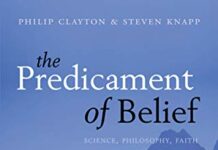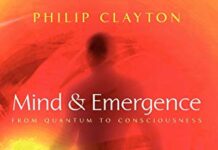
Ebook Info
- Published: 2008
- Number of pages: 330 pages
- Format: PDF
- File Size: 2.87 MB
- Authors: Philip Clayton
Description
Much of the modern period was dominated by a `reductionist’ theory of science. On this view, to explain any event in the world is to reduce it down to fundamental particles, laws, and forces. In recent years reductionism has been dramatically challenged by a radically new paradigm called `emergence’. According to this new theory, natural history reveals the continuous emergence of novel phenomena: new structures and new organisms with new causal powers. Consciousness is yet one more emergent level in the natural hierarchy. Many theologians and religious scholars believe that this new paradigm may offer new insights into the nature of God and God’s relation to the world. This volume introduces readers to emergence theory, outlines the major arguments in its defence, and summarizes the most powerful objections against it. Written by experts but suitable as an introductory text, these essays provide the best available presentation of this exciting new field and its potentially momentous implications.
User’s Reviews
Editorial Reviews: Review `Offers an excellent introduction to the diverse perspectives on this subject. ‘ Faith and Theology About the Author Philip Clayton is a Professor of Philosophy and Religion at Claremont Graduate University and Ingraham Professor at the Claremont School of Theology. Paul Davies is a Professor of Natural Philosophy at the Australian Centre for Astrobiology at Macquarie University in Sydney.
Reviews from Amazon users which were colected at the time this book was published on the website:
⭐The Re-Emergence of Emergence is a collection of thoughtful essays on emergence. I read this initially last year (?) but keep coming back to my favorite essay of the book by Terrence Deacon, Emergence: The Hole at the Wheel’s Hub. Deacon’s thesis is: “emergent phenomena grow out of an amplification dynamic that can spontaneously develop in very large ensembles of interacting elements by virtue of the continuing circulation of interaction constraints and biases, which become expressed as system-wide characteristics. In other words, these emergent forms of causality are to a curious type of circular connectivity of causal dynamics, not a special form or causality.” Deacon goes on to make a pretty compelling case.As one other reviewer noted, there are parts of this books which are pretty technical (for the Deacon essay mentioned above, I liberally used the dictionary and a couple of science reference books in my library)—that said, this volume is worth the price.Highly recommended.
⭐In this excellent, inspiring, and hugely relevant volume, 13 philosophers, scientists and theologians debate the concept of emergence. The physical world generates higher level systems, but are these fully explained by, predicted from, and reducible to the originating physical state? Or is there an ontology of emergent entities which require higher level analysis, and exert downward causation?Philip Clayton follows Michael Polanyi in proposing the irreducibility of personhood (p15, 312). David Chalmers writes that ‘consciousness alone is a strongly emergent phenomena, since its nature is not deducible from physical facts’ (p246). George Ellis argues for ‘a richer ontology than simple physicalism’, pointing out that ‘goals, symbols and expectations are all strongly emergent phenomena that are causally effective, but are certainly not derivative from physics or chemistry’ (p104). Michael Silberstein agrees that ‘mental properties are not fully determined by the neurochemical properties of underlying brain states’. He opts for ‘ontological emergence (which) does violate causal closure of the physical’ (p204). For Arthur Peacocke ‘mental properties are …epistemologically irreducible to physical neurological ones’ (p267). Flock behaviour affects birds, and group behaviour humans. Lynne Rothschild applies the ‘salt’ test of the unpredictability of saltiness from sodium and chlorine to claim that ‘emergent phenomena are unpredictable’ and furthermore that ‘if emergence exists, absolute reductionism fails’ (p156). She argues that ‘life can never be truly understood from only a reductionist perspective’ (p163).Paul Davies however points out that ‘strong emergence over-determines a Newtonian system’ (p46). Neils Henrik Gregersen writes that all emergents are also resultants (p285) so that reductionism survives. There are no new entities or forces at the emergent level. Terrence Deacon proposes a complex circle of causality whereby an ‘amplification dynamic’ yields emergent phenomena and ‘decries using emergence as an anti-reductionist code word in holistic criticisms of standard explanations’ which he regards as ‘pointless semantic debates’ (p123). For Jaegwon Kim, physicalism survives undented by emergence (p189-202).In one sense, physicalism has it, in that there are no emergent properties without physical matter. But it cannot yet unambiguously determine life. Moreover, whilst physicalism generates and hosts emergent properties, they cannot yet be explained physically. And even if they could, this does not necessarily mean that they should then be perceived physically. A musical tune can be fully explained by reductionist physicalism, but is still perceived as emergent. Human consciousness cannot yet be explained physically, but, if it is, will still retain its own ontology.We are still more than our molecules, and can still develop our being as intellectual, emotional, and spiritual beings, and not just as physical bodies.Geoff CrockerEditor ‘Atheist Spirituality’ web site
⭐This book offers an overview of emergence in the physical sciences, biological sciences, the mind and theology, but it is not designed for general readers. I bought the book looking for a general account of the dispute between reductionism and emergence based on the presence of Paul Davies who writes well for those outside of science. I also thought that since they includeded theology that the essays were designed for people without technical backgrounds. I enjoyed Davies’ essay, but most of the other essays need more background for general readers than the authors provide. Some essays require a Ph.D. to understand any words in a sentence besides “is,” “and” and “the.” The authors also are so enthusiastic for emergence that they do not give the alternative of reductionism a fair hearing — they should know many scientists and philosophers reject “strong” forms of emegerence.
⭐In this excellent, inspiring, and hugely relevant volume, 13 philosophers, scientists and theologians debate the concept of emergence. The physical world generates higher level systems, but are these fully explained by, predicted from, and reducible to the originating physical state? Or is there an ontology of emergent entities which require higher level analysis, and exert downward causation?Philip Clayton follows Michael Polanyi in proposing the irreducibility of personhood (p15, 312). David Chalmers writes that ‘consciousness alone is a strongly emergent phenomena, since its nature is not deducible from physical facts’ (p246). George Ellis argues for ‘a richer ontology than simple physicalism’, pointing out that ‘goals, symbols and expectations are all strongly emergent phenomena that are causally effective, but are certainly not derivative from physics or chemistry’ (p104). Michael Silberstein agrees that ‘mental properties are not fully determined by the neurochemical properties of underlying brain states’. He opts for ‘ontological emergence (which) does violate causal closure of the physical’ (p204). For Arthur Peacocke ‘mental properties are …epistemologically irreducible to physical neurological ones’ (p267). Flock behaviour affects birds, and group behaviour humans. Lynne Rothschild applies the ‘salt’ test of the unpredictability of saltiness from sodium and chlorine to claim that ‘emergent phenomena are unpredictable’ and furthermore that ‘if emergence exists, absolute reductionism fails’ (p156). She argues that ‘life can never be truly understood from only a reductionist perspective’ (p163).Paul Davies however points out that ‘strong emergence over-determines a Newtonian system’ (p46). Neils Henrik Gregersen writes that all emergents are also resultants (p285) so that reductionism survives. There are no new entities or forces at the emergent level. Terrence Deacon proposes a complex circle of causality whereby an ‘amplification dynamic’ yields emergent phenomena and ‘decries using emergence as an anti-reductionist code word in holistic criticisms of standard explanations’ which he regards as ‘pointless semantic debates’ (p123). For Jaegwon Kim, physicalism survives undented by emergence (p189-202).In one sense, physicalism has it, in that there are no emergent properties without physical matter. But it cannot yet unambiguously determine life. Moreover, whilst physicalism generates and hosts emergent properties, they cannot yet be explained physically. And even if they could, this does not necessarily mean that they should then be perceived physically. A musical tune can be fully explained by reductionist physicalism, but is still perceived as emergent. Human consciousness cannot yet be explained physically, but, if it is, will still retain its own ontology.We are still more than our molecules, and can still develop our being as intellectual, emotional, and spiritual beings, and not just as physical bodies.Geoff CrockerEditor ‘Atheist Spirituality’ web site
⭐
Keywords
Free Download The Re-Emergence of Emergence: The Emergentist Hypothesis from Science to Religion in PDF format
The Re-Emergence of Emergence: The Emergentist Hypothesis from Science to Religion PDF Free Download
Download The Re-Emergence of Emergence: The Emergentist Hypothesis from Science to Religion 2008 PDF Free
The Re-Emergence of Emergence: The Emergentist Hypothesis from Science to Religion 2008 PDF Free Download
Download The Re-Emergence of Emergence: The Emergentist Hypothesis from Science to Religion PDF
Free Download Ebook The Re-Emergence of Emergence: The Emergentist Hypothesis from Science to Religion



